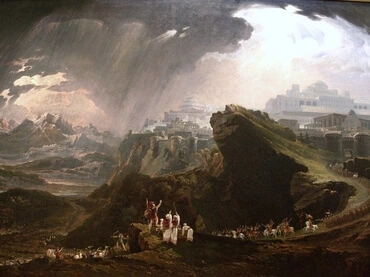1
And to<sup>▵sup> Moses He said, Come··up to<sup>▵sup> Jehovah, thou<sup>◦sup> and Aaron, Nadab and Abihu, and seventy of the elders of Israel; and bow· yourselves ·down afar··off.
2
And Moses, he alone, shall approach Jehovah; and they shall not approach; and the people shall not go··up with him.
3
And Moses came and recounted◦ to the people all the words of Jehovah, and all the judgments; and all the people answered with one voice, and said, All the words that Jehovah has spoken we will do.
4
And Moses wrote all the words of Jehovah, and got··up··early in the morning, and built an altar under the mountain, and twelve pillars for the twelve tribes of Israel.
5
And he sent lads of the sons of Israel, and they offered··up burnt··offerings, and sacrificed sacrifices of peace··offerings of bullocks to Jehovah.
6
And Moses took half of the blood, and put it into basins◦; and half of the blood he sprinkled on the altar.
7
And he took the book of the covenant, and read it in the ears of the people; and they said, All that Jehovah has spoken we will do and hear.
8
And Moses took the blood, and sprinkled on the people, and said, Behold the blood of the covenant that Jehovah has cut with you upon all these◦ words.
9
And there went up Moses and Aaron, Nadab and Abihu, and seventy of the elders of Israel.
10
And they saw the God of Israel; and there was under His feet as what is made of the sapphire stone, and as the substance of the heavens as to cleanness.
11
And to the sons of Israel who were set apart He sent not His hand; and they beheld God, and did eat and drink.
12
And Jehovah said to Moses, Come up to Me into the mountain, and be thou there; and I will give thee the tablets of stone, and the law, and the commandment, which I will write to teach them.
13
And Moses rose··up, and Joshua his minister; and Moses went··up to▵ the mountain of God.
14
And he said to▵ the elders, Sit ye in this place for us, until we return to▵ you; and behold Aaron and Hur are with you; whoever◦ has words*, let him approach them.
15
And Moses went up to the mountain, and the cloud covered the mountain.
16
And the glory of Jehovah abode◦ on Mount Sinai, and the cloud covered it six days; and on the seventh day He called to Moses from the midst of the cloud.
17
And the appearance of the glory of Jehovah was as a devouring fire on◦ the head of the mountain in the eyes of the sons of Israel.
18
And Moses came into the midst of the cloud, and went up to the mountain; and Moses was in the mountain forty days and forty nights.







